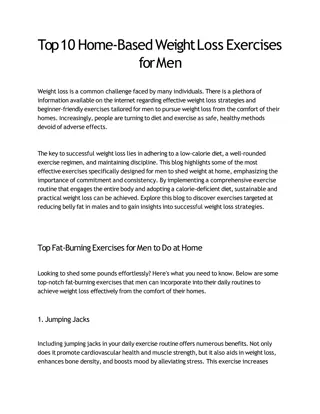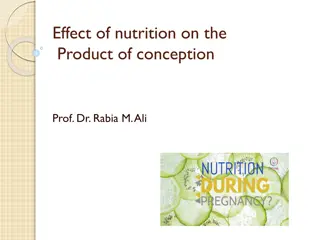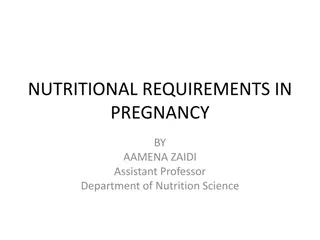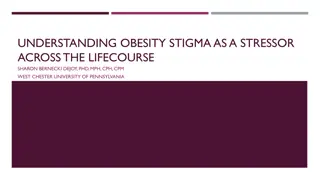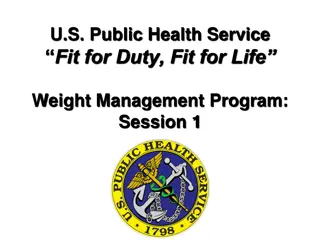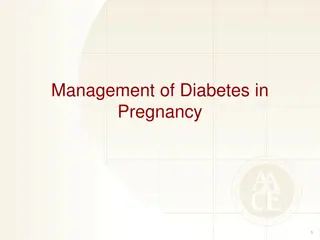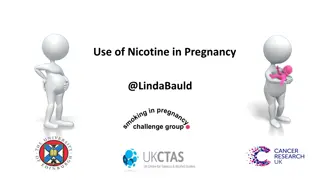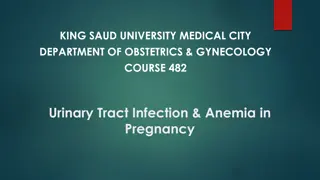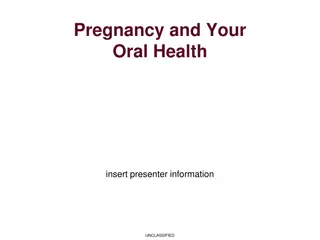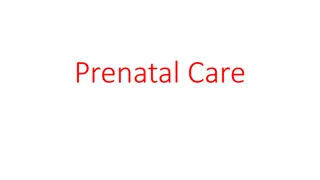Principles of Healthy Pregnancy Weight Gain
Discussion on achieving healthy gestational weight gain is crucial for the well-being of both mothers and babies. It is essential to address root causes early, set realistic goals, and support women in maintaining recommended weight gain levels to avoid negative health outcomes. Success is measured by adopting health-improving behaviors and managing weight effectively throughout pregnancy.
Download Presentation

Please find below an Image/Link to download the presentation.
The content on the website is provided AS IS for your information and personal use only. It may not be sold, licensed, or shared on other websites without obtaining consent from the author.If you encounter any issues during the download, it is possible that the publisher has removed the file from their server.
You are allowed to download the files provided on this website for personal or commercial use, subject to the condition that they are used lawfully. All files are the property of their respective owners.
The content on the website is provided AS IS for your information and personal use only. It may not be sold, licensed, or shared on other websites without obtaining consent from the author.
E N D
Presentation Transcript
Overview The 5 Key Principles of Healthy Pregnancy Weight Gain ASK for Permission to Discuss Weight ASSESS Potential Root Causes of Guideline-Discordant Weight Gain ADVISE on Pregnancy Weight Gain Risk and Management Options AGREE on a Realistic SMART Plan to Achieve Health Behaviour Outcomes ASSIST Women in Identifying Barriers and Facilitators, Educate, Refer and Arrange Follow-Up
Key Principles Discussion About Gestational Weight Gain Should Occur With Every Woman Who is Pregnant or Planning a Pregnancy Achieving Healthy Gestational Weight Gain is About Improving Health and Well-Being of Both Mothers and Babies Early Action Means Addressing Root Causes and Removing Roadblocks Pregnancy-Related Health Beliefs Can Be Powerful Influences on Weight Gain in Pregnancy Achieving Goals is Different for Every Woman
Key Principles Discussion About Gestational Weight Gain Should Occur With Every Woman Who is Pregnant or Planning a Pregnancy A woman planning or experiencing a pregnancy is usually very motivated to be as healthy as possible. Discussion of gestational weight gain from a patient-centered perspective allows providers to have sensitive conversations that are meaningful to the individual woman, regardless of her prepregnancy body mass index (BMI underweight, normal weight, overweight, or obese). Supporting all women to keep gestational weight gain within recommended parameters is important because unhealthy weight gain (excessively lower or higher than recommended) is linked to a range of negative health outcomes for mothers, babies, and children.
Key Principles Achieving Healthy Gestational Weight Gain is About Improving Health and Well-Being of Both Mothers and Babies Success should be measured by the degree to which a women adopts behaviours that improve or maintain health, in addition to the amount of weight she gains. Even modest approximations to the recommended gestational weight gain can improve personal health and reduce post-partum weight retention.
Key Principles Early Action Means Addressing Root Causes and Removing Roadblocks Successful weight management of gestational weight gain begins with identifying how much weight a woman should gain based on her prepregnancy BMI category and having early and repeated discussions to identify and address the myths, barriers, and facilitators of managing gestational weight gain. Refer to Health Canada guidelines.
Key Principles Pregnancy-Related Health Beliefs Can Be Powerful Influences on Weight Gain in Pregnancy Understanding a woman s cultural context is critical. Making assumptions about health behaviours can lead to ineffective interventions.
Key Principles Achieving Goals is Different for Every Woman Women vary considerably in their readiness and capacity for managing gestational weight gain. Achieving Goals can be defined as better quality of life, greater self- esteem, higher energy levels, improved overall health and/or achieving weight gain within the recommended range. Guideline-concordant weight gain in pregnancy is not a realistic goal for some women, and setting unachievable targets might simply set women up for failure. Instead, help women set weight targets that they can achieve to try to improve health for themselves and their babies.
ASK for Permission to Discuss Weight Body weight may be a sensitive issue. Even though weight gain in pregnancy is expected, asking is an important first step.
ASK Be Non-Judgmentally Curious Ask Questions Before Making Statements Explore Readiness for Change
ASK Be Non-Judgmentally Curious Do acknowledge that weight gain is healthy and to be expected during pregnancy. Do provide education about the recommended amount of weight gain to optimize health. Do not make assumptions about a woman s life, lifestyle or motivation. She may be living as healthy a lifestyle as she can, or she may be ready to take action, or in the action stage of making changes.
ASK Ask Questions Before Making Statements Be non-judgmentally curious. Ask questions, listen to the woman s answers and respond in a manner that validates her experience, acknowledges her autonomy to make her own choices and invites her to consider the benefits of your recommendations. Do provide education about the recommended amount of weight gain to optimize health. If she is not ready to follow through on your recommendations be prepared to address her concerns and barriers and explore her reasons not to change. Ask for permission to keep the conversation about healthy weight gain going at future visits.
ASK Explore Readiness for Change Determining a woman s readiness to change behaviour in accordance with your recommendations is essential for success. Recognize that different women will be at different stages of readiness. Supporting behaviour change and increasing readiness if it is lacking requires a genuine collaboration that acknowledges that the woman is central. Initiating change when a woman is not ready can result in frustration and elicit resistance and learned helplessness. This can interfere with future attempts to support healthy change.
ASK Sample Questions on How to Begin a Conversation about Weight: Could we discuss your thoughts and feelings regarding weight gain during your pregnancy? Are you concerned about weight gain during pregnancy? Would you be interested in information about weight gain during pregnancy?
ASSESS Potential Root Causes of Guideline-Discordant Weight Gain
ASSESS Assess prepregnancy BMI Weigh at every prenatal visit Use the 4Ms framework (mental, mechanical, metabolic and milieu) to assess drivers and complications of guideline-discordant pregnancy weight gain as well as barriers to guideline-concordant pregnancy weight gain at every prenatal visit Consider pregnancy-related health beliefs these can be powerful influences on gestational weight gain
ASSESS Obesity Class Meana rate of weight gain in the 2nd and 3rd trimester Prepregnancy BMI Recommended total weight gainb (for singleton pregnancies) kg/week Ib/week kg lbs Underweight (<18.5kg/m2) 0.5 1.0 12.5 18 28 40 Normal weight (18.5-24.9kg/m2) 0.4 1.0 11.5 16 25 35 Overweight (25.0-29.9kg/m2) 0.3 0.6 7 11.5 15 25 Obese ( 30.0kg/m2)c 0.2 0.5 5 9 11 20 Taken from Health Canada website: www.hc-sc.gc.ca/fn-an/nutrition/prenatal/ewba-mbsa-eng.php a. Rounded values b. Calculations for the recommended weight gain range assume a gain of 0.5 to 2 kg (1.1 to 4.4 lbs) in the first trimester (Siega-Riz et al., 1994; Abrams et al., 1995; Carmichael et al., 1997). c. A lower weight gain may be advised for women with a BMI of 35 or greater, based on clinical judgment and a thorough assessment of the risks and benefits to mother and child (Crane et al., 2009; Oken et al., 2009; Hinkle et al., 2010).
ASSESS The 4Ms of Gestational Weight Gain: Mental Addiction Anxiety Body Image Depression Emotional eating and eating disorders Cravings and aversions Insomnia Metabolic Diabetes mellitus Hyperemesis gravidarum and nausea Medications Multiple gestation Preeclampsia Mechanical Incontinence Pain Sleep disturbance Disability and reduced mobility Milieu Family structure including relationships and children Employment Ethnicity and culture Accessibility to healthy food Income Support at home and at work
ADVISE on Pregnancy Weight Gain Risk and Management Options
ADVISE Gestational weight gain (lower or higher than recommended) is linked to negative health outcomes for mothers and their babies. Gestational weight management should be improving health and well-being for both the woman and her baby rather than only measuring weight.
ADVISE Discuss the need for a strategy throughout pregnancy and the postpartum period. Explain benefits of gaining within the guidelines. Advise on management options.
ADVISE Discuss the need for a strategy throughout pregnancy and the postpartum period All management strategies must be feasible and sustainable. Different strategies may be needed at different stages.
ADVISE Explain Benefits of Gaining Within the Guidelines Healthy Weight gain within the guidelines can result in substantial health improvements for: Women: Babies: Fewer complications before, during, and after birth. Blood glucose control. Blood pressure control. Less weight to lose after birth. Healthy birth weight. Less birth trauma. Less chance of needing to be admitted to a special care nursery/intensive care nursery (e.g. blood glucose control, temperature control). Less chance of overweight and obesity during childhood and as an adult.
ADVISE Advise on Management Options WEIGHT GAIN PHYSICAL ACTIVITY SLEEP, TIME, and STRESS SEDENTARY BEHAVIOUR EATING BEHAVIOUR MENTAL HEALTH
ADVISE WEIGHT GAIN Should be based on prepregnancy BMI. Women with higher prepregnancy BMI require less weight gain. Please refer to the guidelines
ADVISE SLEEP, TIME, and STRESS Management interventions may improve eating and activity behaviours as well as mood.
ADVISE EATING BEHAVIOURS Should focus on healthy nutrition. An extra 2 3 Food Guide servings totaling about 250- 500kcal/day Trimesters 2 and 3 only. Fruit and vegetables, grains, milk and alternatives, meat and alternatives. E.g. 1 piece of fruit + c of yogurt; 1 piece of toast + 1 cup of milk. Exercise caution with cravings.
ADVISE PHYSICAL ACTIVITY Interventions should promote physical activity (if there are no contraindications) throughout pregnancy.
ADVISE SEDENTARY BEHAVIOUR Women should be encouraged to reduce sedentary time (e.g. television, computer, social media, video games).
ADVISE MENTAL HEALTH Is an important aspect of health. Women should be encouraged to focus on experiences (activities or relationships) that enhance positive self-esteem, well- being and quality of life throughout their pregnancy. Referral for mental health treatment in situations where there are underlying/co-morbid psychological issues or problems is recommended.
AGREE on a Realistic SMART Plan to Achieve Health Behaviour Outcomes
AGREE Agree on Sustainable Behavioural Goals Behavioural Goals Should be SMART Agree on the Plan
AGREE Agree on Sustainable Behavioural Goals Focus on sustainable behavioural changes rather than on specific weight targets. Unrealistic goals can lead to disappointment and may encourage unhealthy habits and non-adherence. Even for a woman who has exceeded weight gain recommendations, meeting the recommended rates of weekly weight gain may be the best goal. Behavioural goals may be different for each woman.
AGREE Behavioural goals should be SMART: Specific Measurable Achievable Rewarding Time-bound Flexible self-monitoring with a lifestyle journal can help initiate and sustain behavioural change
AGREE Agree on the Plan Management plans should be realistic and sustainable. Management plans should consider addressing environmental, socio- economical, familial, or cultural drivers of excessive weight gain (e.g. anxiety, family stressors, etc.). The success of the plan should be measured as sustained healthy behvaioursand mother s well-being (e.g. physical and mental health).
ASSIST Women in Identifying Barriers and Facilitators, Educate, Refer and Arrange Follow-Up
ASSIST Assist Women in Identifying and Addressing Drivers and Barriers Assist Women in Identifying Facilitators and in Maintaining Healthy Behaviours Offer Education and Resources Refer to Appropriate Providers Arrange Follow-Up
ASSIST Assist Women in Identifying and Addressing Drivers and Barriers Drivers and barriers may include environmental, socio-economical, emotional, medical or cultural factors. Physical barriers or physical discomfort (e.g. lack of sleep, mobility) may hinder participation in routine daily activities.
ASSIST Assist Women in Identifying Facilitators and in Maintaining Healthy Behaviours Supporting women to maintain/regain healthy behaviours may increase their personal commitment to health in the face of barriers. Identifying facilitators to guideline-concordant gestational weight gain may help tip the balance toward motivation for healthy behaviour as well as support self-efficacy.
ASSIST Offer Education and Resources Education to improve understanding is central to self-management. Help women identify and seek out CREDIBLE pregnancy specific health behaviour and weight-management information and resources.
ASSIST Refer to Appropriate Providers Evidence supports that weight management throughout pregnancy is more successful using an interdisciplinary team approach. Choice of appropriate provider (e.g. GP, OB, MFM, midwife, nurse, dietitian, exercise physiologist, psychologist, etc.) should reflect identified DRIVERS and complications of excessive weight gain as well as BARRIERS to weight management during this critical period.
ASSIST Arrange Follow-Up Follow-up is essential, given the prevalence of excessive weight gain in pregnancy and the subsequent high probability of post-partum weight retention, which can lead to immediate and downstream complications. The child-bearing years are a natural period of weight cycling (for those who have experienced more than one pregnancy), and returning to a healthy weight should be encouraged.
Professional Resources Adamo K, Bell R, McDonald S, Piccinini-Vallis H, Vallis M, with the Canadian Obesity Network Healthy Pregnancy Working Group. 5As of Healthy Pregnancy Weight Gain. http://www.obesitynetwork.ca/pregnancy. Published July 2014. To download a copy of the Practitioner Guide, visit www.obesitynetwork.ca/pregnancy




